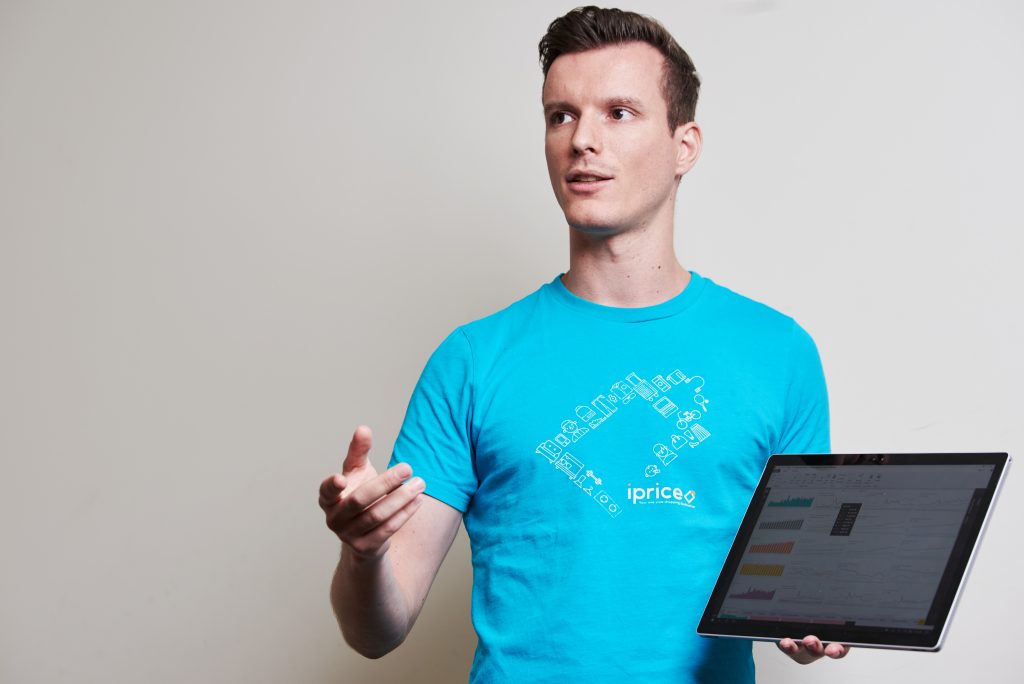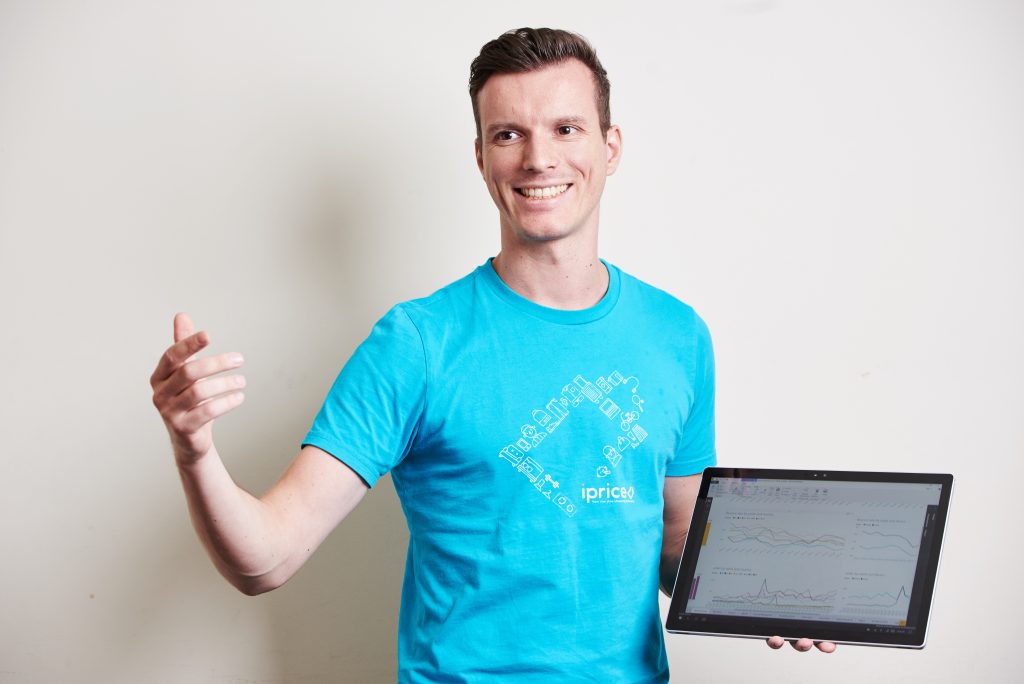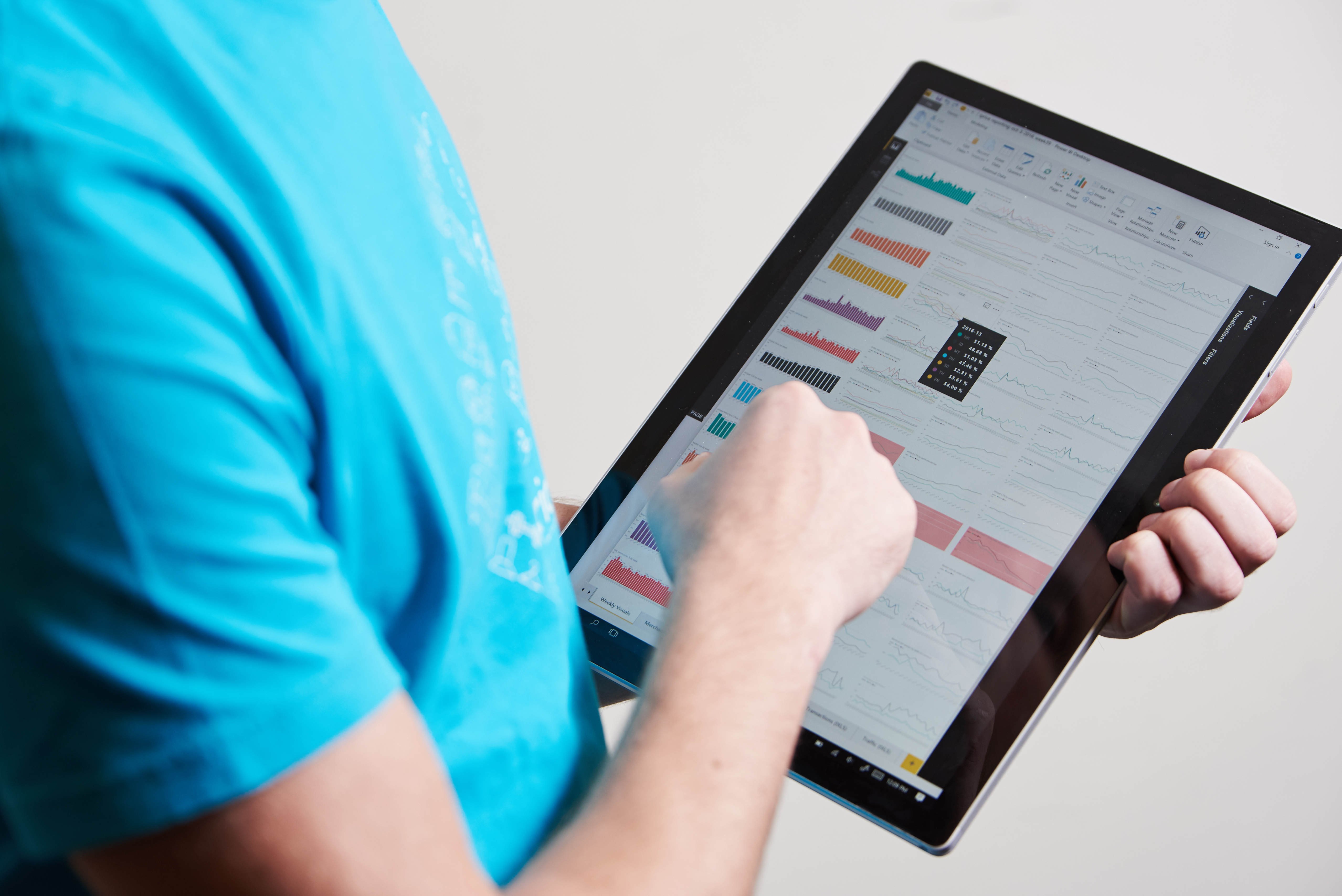In this Microsoft news feature series, we delve into some of the key industry trends in technology – big data, cloud analytics and machine learning. Dr Dzahar Mansor, National Technology Officer of Microsoft Malaysia interviews prominent key opinion leaders in tech and partners of Microsoft to find out how big data is applied across businesses in Malaysia.
In the third interview of this series, Dr Dzahar speaks to Heinrich Wendel, Co-founder and Chief Technology Officer (CTO) of iPrice – Southeast Asia’s largest online shopping website that offers shoppers the widest selection of products and brands, provided by hundreds of partners in the region – to understand how the use of analytics helps drive greater business efficiency.
Dr Dzahar: I understand that you use Power BI. Tell us why you chose Power BI and how your journey has been with it so far?
Heinrich: Professional Business Intelligence (BI) tools from industry giants like Tableau or Qlik have been around for multiple decades by now, but they were extremely expensive. When I say expensive, I don’t only mean the licensing costs, but on top of that, you also need to run and maintain it in your own data center and hire trained professionals who could utilize the software. Let’s also not forget about the big consulting projects you need to start, in order to build your data warehouse and also the additional money you spend buying a stack of database technology.
After all of that, every other question you would like to have answered will require you to go to the BI department for them to crunch numbers for days before they can come back with an answer. A startup could never afford this in monetary terms, but what’s more important in the speed of decision making required.
PowerBI fundamentally changes this game by commoditizing BI and moving the needle from implementation and analysis to the actual insights and decision making. What makes PowerBI attractive to startups like ourselves is not only the highly affordable cost, but also the ease of using the platform which is easily integrated into more existing databases and more complex technologies such as cloud.
For instance, any team member in the organization can take their first step to learn how to use PowerBI by simply learning how to create a Pivot table in Excel.
Furthermore, there is no need any more to completely rethink the architecture of your solution, which is critical in a high growth environment. This works well in a startup environment where the tools are available anywhere on any platform, even on the go.
This is what makes BI accessible for a startup like us. Our experience so far has been only positive; I would always make the same decision again. Of course nothing is perfect, you don’t catch up with established players that have been in the market for 10+ years from today to tomorrow. But Microsoft behaves like a startup themselves – they listen to feedback of customers and pushes out improvements on a monthly basis. This gives us the confidence that PowerBI will continue to grow at the same pace as we do.
Dr Dzahar: What sort of analytics does iPrice need to run its operations more efficiently?
Heinrich: At the core of our business, we match shoppers’ demands with the supply that e-commerce merchants have in stock so that a user always gets the best matching offer with the best price. To remain on top of the ecommerce scene, we track hundreds of millions of online searches and prioritize our sales, categorization and marketing operations based on that.
After we catch the initial attention of the user, we have to convert him/her to a purchase on the site of one of our partner shops. To better understand the user’s behavior and intent, we track the complete user journey through our website and then lead them to the appropriate products and deals on our site.
We get a complete picture of our e-commerce funnel by aggregating the data from a variety of systems, both from SQL and NoSQL and feed it into PowerBI. We analyze potential drop offs and patterns that show particularly high or low engagement rates. This requires a lot of attention to detail, and with e-commerce in Southeast Asia (SEA), we are currently talking about conversion rates in the lower single digits – meaning by only increasing a single percentage point, it will make a huge difference to the marketing budget of our partners.

Dr Dzahar: Could you give us an example of what kind of insights you have gathered so far, and how it has improved your business?
Heinrich: Koreans are known for their fondness of beauty and health products, a trend that recently also entered SEA. Using our analytics, one of our team leads spotted this trend, and we immediately reacted on it, which involved the joint effort of multiple internal teams. In this case it started with the sales team, which scouted the web for merchants that supply these products, and we immediately reached out to them to close contracts listing them on our platform. One of the newcomers was the online store Althea, that had just opened its website back then, and we were the first affiliate to get them on board.
In order to obtain the highest data quality, we get the standard data we receive from merchants and proceed to clean it up, then enrich, classify and categorize it. To address all of this we developed in-house tools that suggest the appropriate categories for these products, which is then signed-off by a team of experts in our categorization team.
While this huge amount of data poses a lot of challenges, it is actually a requirement to enable these kinds of scenarios. Algorithms to do that existed a long time ago, but only this amount of data enables us to make the correct suggestions. There is a final QC check before this new merchant is picked up in our nightly product import, which is then updated on a daily basis.
Being able to react at this speed, crunching through a vast amount of data, wouldn’t have been possible still a few years ago. That is the power that this new generation that BI tools enables.

Dr Dzahar: Where do you see the most impact of this technology for your business? What has been your learnings?
Heinrich: For us this technology is core to our business, we would not exist without it. Currently, we recognize our key pillars in having a strong team, a regional presence, and a lot of traffic coming to our site. But we recognize that ultimately, it’s the data that is the real value, as it shows us what is unique, what has the biggest value, and the insights we actually get out of it.
In a digital business the amount of data available is fundamentally changing the way how businesses are run. The traditional approach of target group > hypothesis on needs > product is now broken. And the reason is that we don’t have to hypothesize about our target group and its needs. We can observe the data and exactly know what is going on.
In the case of the rise of Korean beauty products here in the region, we were one of the first ones to react.
And this was Data driven, not hypotheses based – we didn’t have to wait, the data was there, and we only had to tap into it.
Today, it’s not about one team of data analysts hidden in some cellar, but instead about a culture that you establish in your leadership team about working with this data and making decisions about it. That was the biggest learning and challenge, now that you have to solve less of the technology problem, you have to focus on changing people’s behavior, which is actually a lot harder.

Dr Dzahar: What would you say is the future of analytics, what would take place in the near future, such as with artificial intelligence?
Heinrich: The tools of the current generation brought analytics in the hands of the business users, avoiding the long implementation phase and the additional step through an expert. The next step will be that the tools predict and suggest insights themselves based on patterns that they “see”.
Right now, we still had to look at the data to identify the Korean beauty trend here and that worked because we established a culture of looking at data on a day-to-day basis in our leadership team. In the not so distant future, we won’t have to do that anymore, because the tools will detect anomalies themselves and suggest actions and next steps based on that. This is really not far ahead.
I wouldn’t go so far as to say that almost anything humanly possible will become automated by AI, like some futurists do – systems are much too complex for that. But look at what big data did – it helped to bring known algorithms to a correctness level of 95%+, but this is only for very discrete problems like face recognition across vast amounts of pictures.
I believe in agent based systems being the next step which will be embedded in every part of our work processes. They will take a lot off the cognitive load that we created ourselves in an information overloaded work environment so that we can really focus on the decision making aspects. Through the decision we make and how we connect process steps they will then learn and feed that information back into the process, but ultimately, it will be a human making the decision. The human can make a much better decision, as all he requires is right at his fingertips.
Dr Dzahar Mansor, National Technology Officer, Microsoft Malaysia
Dr Dzahar has been at the heart of all the cloud and big data related initiatives in the organization. With his passion in technology, Dr Dzahar consistently represents Microsoft Malaysia as a technology thought leader at relevant events in both Malaysia and South East Asia, while acting as an academic advisor in several national universities and research institutions. He also previously contributed to the development of national technology and strategic roadmaps such as the Economic Transformation Program, the National IoT Blueprint and the National Strategic ICT Roadmap.
Heinrich Wendel, Co-founder and CTO, iPrice Group
Heinrich aspired to be a technopreneur at a young age and obtained a Master’s degree from The University of Bonn, Germany while gaining working experience at the German Aerospace Centre as an Undergraduate Researcher. From there, he spent four years at Microsoft Corporation as an Enterprise Consultant and Program Manager. By 2014, he saw great potential for the e-commerce sector to flourish in SEA and went on to establish iPrice in Malaysia. To date, he and his team have successfully expanded the company to over 100 employees from 25 different countries.



